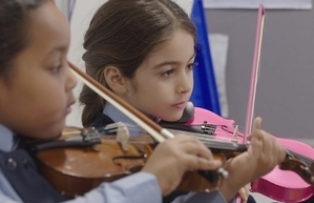The Department for Education is asking musicians, teachers, students and parents for their views in a ‘Call for Evidence’

The UK government’s Department for Education is inviting musicians, specialist teachers, young people and their parents to share their views and experiences and what they want to see in the new ‘national plan for music education’.
The current national plan for music education policy paper, which was published in 2011 and extends until 2020, established the music education hubs – a network designed to give children the opportunity to sing and learn instruments. The refreshed national plan will be published in autumn 2020 and will build on the current plan.
A press release issued by the Department of Education states: The Call for Evidence includes specific questions on areas experts have told us are particularly important, including SEND and inclusivity, music technology and the music education hubs. The responses and experiences put forward will help inform changes to the plan which will then be fully consulted on.
The initiative is designed to help reflect advances in technology in the way music is created, recorded and produced, and to reassess the music education young people benefit from at school, the news release states. It continues: The plan will help level up opportunities for children from all backgrounds to take part in musical education, including the chance to learn how to play an instrument, perform in a choir or band, and develop a lifelong love of music.
Read: UK primary music education is a lottery. Here’s how to help
Read: 5 steps to help save music education in the UK
Read: New music education report reveals that EBacc is driving out creative subjects
School Standards Minister Nick Gibb said: ‘All children, regardless of their background, should get the opportunity to play musical instruments, learn to sing and learn how to read and write music in the classroom. I want to continue to level up opportunities so all young people can get the best out of their music education. We can only achieve this if we reflect on the latest advances in music and work together with experts in the music industry, specialist teachers, as well as reflecting on young people’s experiences.’
Chief Executive of the Arts Council, Dr Darren Henley said: ‘Learning to perform and compose music is a life changing experience, unlocking decades of discovery, enjoyment and creativity. The Government’s commitment to a new National Plan for Music Education is an exciting step in nurturing the next generation of creative talent across England. These young people will go on to become the music industry professionals and the audiences of the future. It’s important that everyone who cares about music takes part in this consultation so that all young people get the chance to fulfil their musical potential.
Lord Andrew Lloyd Webber said: ‘Every child should have the right to free music education as a vital part of the school curriculum. Music is an empowering force for good. I am very pleased that the Department For Education has taken on board the proven achievements of the Music In Secondary Schools Trust. Under its aegis, 8,000 children now have full access to music whereas before there was none. Parents report that their children now have pride in their accomplishments and that their self-esteem, confidence and self-worth have grown. It has been proven to be the common denominator in schools where often over sixty languages are spoken. I passionately hope this is the beginning of seeing music back where it belongs as a central part of our schools’ curriculum.’
The government recently announced £80 million for a further year of its current music and arts programmes, including music hubs.











































No comments yet